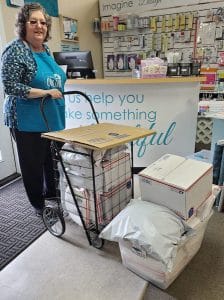Businesses balancing needs and fears

As Illinois begins to loosen restrictions put in place to help curb the spread of the novel coronavirus, more businesses have been allowed to resume activity in some form after the latest stay at home order went into effect May 1.
While Monroe County establishments have been glad to increase their revenue, the ability to open more has come with complications as business owners look to balance their needs and fears.
“I think everybody is torn with this,” said Danielle Cyvas, co-owner of Warm n Cozy Quilting in Columbia. “I want to do more, but I also don’t want to get anyone else sick or myself sick. You have these fears in the back of your head.”
Under Gov. JB Pritzker’s latest executive order, essential businesses and manufacturers are required to supply face coverings to employees who cannot maintain social distancing and take other precautions.
The order also expanded essential businesses to include greenhouses, garden centers, nurseries and animal grooming services while permitting non-essential retail stores to open to fulfill phone and online orders for pick-up and delivery.
In the weeks prior to that, the situation for many of those businesses looked grim as they remained closed or only sold items they could ship to customers through online ordering.
“It was a little stressful not knowing what the future was and we kept getting mixed answers on whether we would be able to open,” Barking Boutique Pet Salon in Waterloo owner Toni Hamblen said. “It was more or less kind of a waiting game. Being a business owner and not knowing what’s going and how long you’re going to be out of business, your future looked kind of dim.”
“It’s been challenging,” Missy Toenjes, owner of The Clothes Line Boutique in Waterloo, agreed. “Being a clothing store, I’ve definitely been missing out on a lot of walk-in business that I would normally have, especially around Easter and Mothers Day.”
Toenjes said being closed for weeks with only her online store forced her to get creative on ways to boost sales to help make ends meet.
Cyvas said the same was true for her as well because people are reluctant to buy fabric online the same way they are less likely to purchase clothes.
One new method Cyvas said saw success was doing Facebook Live sales that allowed people to see her products that could be mailed to them.
“That kept us going,” Cyvas noted. “Without having the Facebook and internet sales that we’ve had, I don’t know where we would be right now.”
Businesses now being able to deliver or have curbside pick-up has been a boon, but it has not been a substitute for having individuals in stores.
Even Hamblen’s pet grooming business has seen that, as she has staggered her appointments to prevent multiple people from being at her establishment at once even though they do not leave their cars.
“Due to the staggering, it’s more of a one-on-one situation so I’ve had to cut back a little bit because I can’t get as many dogs done,” she explained. “It’s great to be able to make the money and pay the bills. Slower-wise, I’ll handle it. You take what you can get. I’m just thankful I got to open back up.”
In addition to spacing out her appointments, Hamblen has also discontinued walk-in service and wears gloves and mask to get pets out of customers’ vehicles. She does not have any direct contact with the customer or even the pet’s leash or collar.
Toenjes and Cyvas also don personal protective equipment for contactless pickup and sanitize themselves and their stores frequently.
“That part’s been pretty easy,” Toenjes said.
Those small business owners have also taken on a greater workload themselves, not hiring their typical part-time staff back in an effort to stay in the black as much as possible.
“I feel like I’m doing 10 times the work,” Cyvas said.
Although sales have increased with local delivery and pickup options, they are not back to normal levels.
That means businesses will most likely take whatever steps they can in the next phase of the state’s regional reopening plan, which will bring fresh concerns.
“This stage hasn’t been too difficult,” Cyvas said. “I’m more worried about the next stage of letting people in and keeping it down to a minimum of people.”






